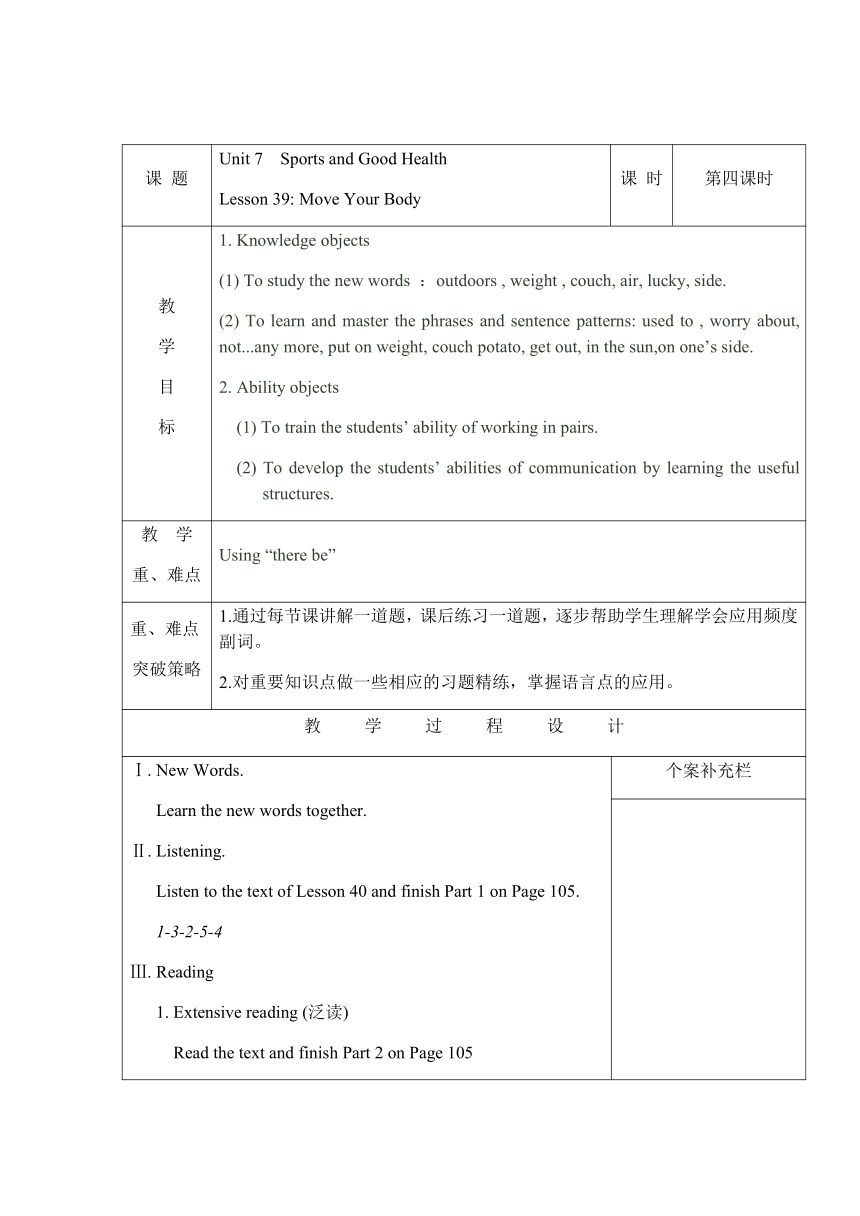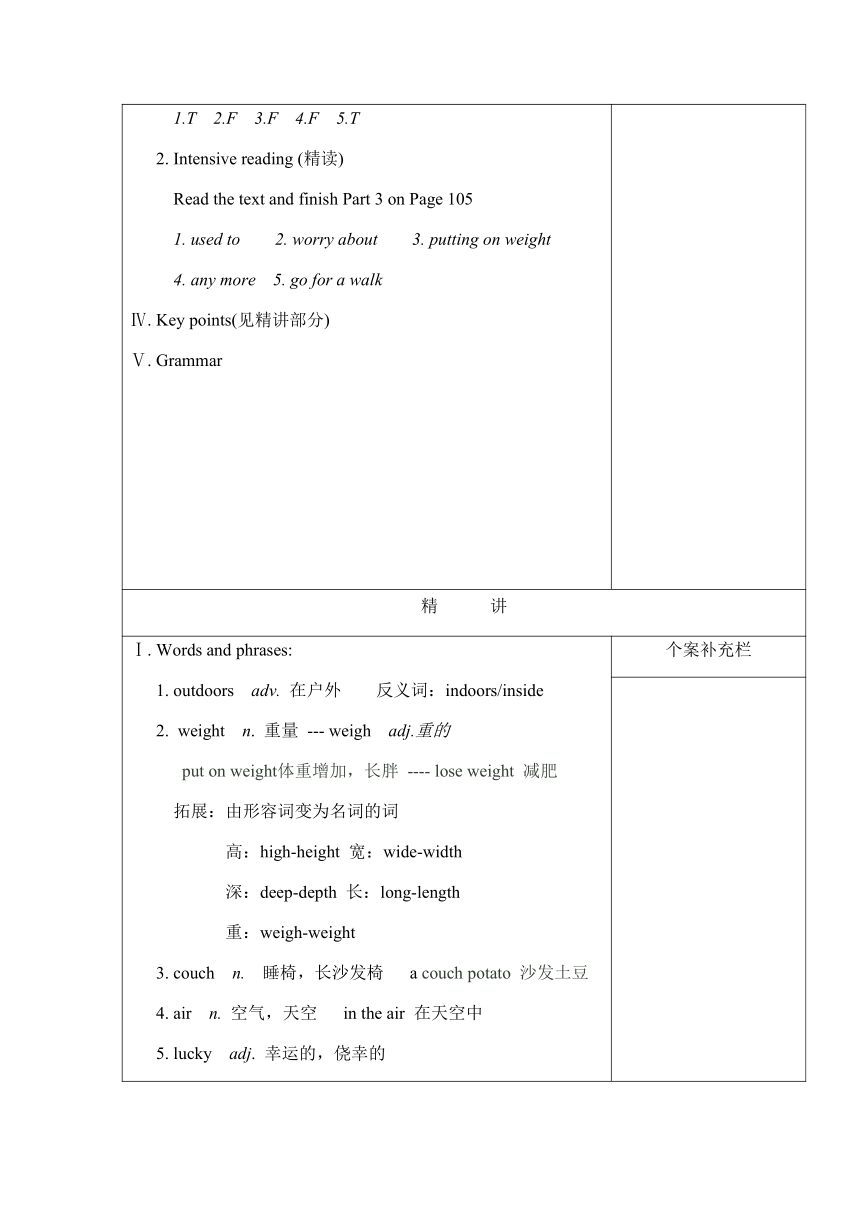冀教版英语七年级下册Unit 7 Sports and Good Health Lesson 40 Move Your Body表格式教案
文档属性
| 名称 | 冀教版英语七年级下册Unit 7 Sports and Good Health Lesson 40 Move Your Body表格式教案 |

|
|
| 格式 | zip | ||
| 文件大小 | 58.0KB | ||
| 资源类型 | 教案 | ||
| 版本资源 | 冀教版 | ||
| 科目 | 英语 | ||
| 更新时间 | 2020-04-29 00:00:00 | ||
图片预览


文档简介
课 题 Unit 7 Sports and Good HealthLesson 39: Move Your Body 课 时 第四课时
教学目标 1. Knowledge objects(1) To study the new words :outdoors , weight , couch, air, lucky, side.(2) To learn and master the phrases and sentence patterns: used to , worry about, not...any more, put on weight, couch potato, get out, in the sun,on one’s side.2. Ability objects (1) To train the students’ ability of working in pairs. (2) To develop the students’ abilities of communication by learning the useful structures.
教 学重、难点 Using “there be”
重、难点突破策略 1.通过每节课讲解一道题,课后练习一道题,逐步帮助学生理解学会应用频度副词。2.对重要知识点做一些相应的习题精练,掌握语言点的应用。
教 学 过 程 设 计
Ⅰ. New Words. Learn the new words together.Ⅱ. Listening. Listen to the text of Lesson 40 and finish Part 1 on Page 105. 1-3-2-5-4Ⅲ. Reading 1. Extensive reading (泛读) Read the text and finish Part 2 on Page 105 1.T 2.F 3.F 4.F 5.T 2. Intensive reading (精读) Read the text and finish Part 3 on Page 105 1. used to 2. worry about 3. putting on weight 4. any more 5. go for a walkⅣ. Key points(见精讲部分)Ⅴ. Grammar 个案补充栏
精 讲
Ⅰ. Words and phrases: 1. outdoors adv. 在户外 反义词:indoors/insideweight n. 重量 --- weigh adj.重的 put on weight体重增加,长胖 ---- lose weight 减肥 拓展:由形容词变为名词的词 高:high-height 宽:wide-width 深:deep-depth 长:long-length 重:weigh-weight 3. couch n. 睡椅,长沙发椅 a couch potato 沙发土豆 4. air n. 空气,天空 in the air 在天空中 5. lucky adj. 幸运的,侥幸的 luck n.------ lucky adj. ------ luckily adv.side n. 边,侧边 on one’s side站在某人一边,支持某人Ⅱ. Key Points: 1. used to的意思是“过去常常做某事”,to是不定式符号,其 后接动词原形。eg. He used to live (live) in Paris.? (1) used to的否定句通常为didn’t use to do sth. used not to do sth. eg. He didn’t use to live in Paris. He used not to live (live) in Paris. (2)含有used to的句子变为一般疑问句时,? “助动词Did+主语+use to do?sth. ?”结构。eg. Did he use to live in Pairs? (3)含有used to的特殊疑问句的结构为 “疑问词+助动词did+主语+use to do...?” eg.Where did he use to live? 拓展:be used to doing sth:现在习惯于做某事 eg. He is used to living (live) in Paris.2. worry about 意为“担心”相当于be worried about worry about为一个动词词组,表示动作 be worried about是be动词+形容词构成的系表结构,表状态 eg. She is worried about her test. = She worries about her test. 3. not...any more=no more 意为“不再...”eg. The boy didn’t cry any more. = The boy no more cried. = The boy cried no more. 4. too much, too many& much too (1) too much 修饰不可数名词前,表示太多 I drank too much wine last night. 作为短语起名词作用。后面可加of短语,也可单独使用。 You give me too much. 放在句末修饰动词。 He talked too much. 不能直接修饰形容词或副词(因为much不能这样用)。 This one is too much big.?(×) (2) much too?修饰形容词或副词的原级”,用来加强语气。?
This one is much too big.??
You are going much too fast.? (3) too many修饰名词复数。?
We have too many questions to ask him.Ⅲ.Grammar--- Using “there be” There is (be) an orange and some bananas in the basket. There are (be) some bananas and an orange in the basket. 个案补充栏
精 练
Ⅰ. 选词填空 1. He?can't?hear?you?because?there?is?_____noise?here.?????? A.very?much? B. too?much????C. much?too? D.so?many??2.Today_____trees?are?still?being?cut?down?somewhere?in?the?world????A.much?too? B.too?much???C.many?too? D.too?many?3.These?shoes?are?much?too?_____for?me. A.big? B.bigger??? ?C.biggest? D.the?biggestⅡ.用some,any填空 There’s water in the cup. There isn’t tea in the cup. Is there bread here? Yes,there is. There’s on the table. Are there cars in front of the building? No, there aren’t. There isn’t chocolate on the table. Is there soup(汤)on the table? 个 案 补 充 栏
I. 选词填空1.B 2. D 3. AⅡ.用some,any填空 1.some 2.any 3.any 4.any 5.any
课 后 反 思
同课章节目录
- Unit 1 A Trip to the Silk Road
- Lesson 1 A Trip to China
- Lesson 2 Meet You in Beijing
- Lesson 3 A Visit to Xi'an
- Lesson 4 A Visit to Lanzhou
- Lesson 5 Another Stop along the Silk Road
- Lesson 6 Jenny's Diary
- Unit 2 It's Show Time!
- Lesson 7 What's Your Project about?
- Lesson 8 Marco Polo and the Silk Road
- Lesson 9 Danny's School Project
- Lesson 10 Music and Dance
- Lesson 11 Food in China
- Lesson 12 A Blog about the Silk Road
- Unit 3 School Life
- Lesson 13 How Is School Going?
- Lesson 14 Jenny's School Life
- Lesson 15 Making a Difference
- Lesson 16 We Are with You!
- Lesson 17 School Science Fai
- Lesson 18 Teaching in China
- Unit 4 After-School Activities
- Lesson 19 A Dinner Date
- Lesson 20 Join Our Club!
- Lesson 21 What Is Your Club Type?
- Lesson 22 Big Plans for the Weekend
- Lesson 23 A Weekend with Grandma
- Lesson 24 How was Your Weekend?
- Unit 5 I Love Learning English!
- Lesson 25 A Phone Friend
- Lesson 26 Online Phone Calls
- Lesson 27 Amazing English
- Lesson 28 How Do I Learn English?
- Lesson 29 A Door to the World
- Lesson 30 Writing an E-mail in English
- Unit 6 Seasons
- Lesson 31 What Strange Weather!
- Lesson 32 I Can't Wait for Winter!
- Lesson 33 Kim's Favourite Season
- Lesson 34 Steven's Report
- Lesson 35 Surfing in Sydney
- Lesson 36 Spring in China
- Unit 7 Sports and Good Health
- Lesson 37 You Are What You Eat!
- Lesson 38 Stay Healthy!
- Lesson 39 Danny's Report
- Lesson 40 Move Your Body
- Lesson 41 Were People Healthy Then?
- Lesson 42 Know Yourself
- Unit 8 Summer Holiday Is Coming!
- Lesson 43 Have a Good Summer!
- Lesson 44 Volunteering in Summe
- Lesson 45 Baseball Season
- Lesson 46 Get Ready for Summer Holiday!
- Lesson 47 Summer Plans
- Lesson 48 Li Ming's Summer Holiday
